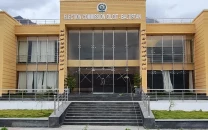Of firsts: Shia delegation attends Tablighi Ijtima
The peace initiative was a follow up after Sunni cleric addressed Central Imamia mosque in Gilgit.

At least 70 people died in 2012 in G-B in sectarian violence. PHOTO: FILE
The Tablighi Ijtima, which started on June 9 in Gilgit, is attended by hundreds of thousands from across the country and is held under the banner of the Tablighi Jamaat, a Sunni organisation. The sermon was delivered by Deobandi preacher Maulana Tariq Jamil.
Hussaini, who is a top Shia cleric in Gilgit-Baltistan (G-B), was also accompanied by the general secretary of Majlis Wahdatul Muslimeen. The invitation to attend the Ijtima had been extended by Jamil after he addressed a congregation at the Central Imamia mosque on the request of Shia clerics.
The initiative to promote peace in a region clearly divided along bloody sectarian lines is being widely appreciated by all and is termed as a breakthrough to promote tolerance.
The Shia delegation reached the Ijtima at approximately 9:30pm on Monday and remained seated there alongside thousands of Sunnis till Jamil ended his speech at about 12:15am.
“Hats off to Agha Rahat, his team and Tariq Jamil for making the impossible possible,” said Amjad Hussain, a member of the G-B Council. “We couldn’t have imagined such a gesture from either side. This is real change that we are talking about.”
Earlier in the sermon at the Central Imamia mosque on Monday, Jamil asked people to shun sectarian hatred, pointing out Islam does not allow killing each other over religious differences.
He continued on similar themes as he addressed the audience at the Ijtimia on Tuesday. “I also request the people of G-B to become role models for the rest of the world.
At least 70 people died in 2012 in G-B in sectarian violence. Sectarian rifts in Gilgit extend all the way to the upper echelons of religious ranks, where until quite recently clerics were issuing decrees against each other. The government ended up temporarily shutting down the central Sunni and Shia mosques and introduced a code of conduct for the nature and delivery of sermons.
In May 2012, the G-B Assembly became the first assembly of Pakistan to enact such a code of conduct into a law; violating the code is a punishable offence for clerics.
Published in The Express Tribune, June 12th, 2013.


















COMMENTS
Comments are moderated and generally will be posted if they are on-topic and not abusive.
For more information, please see our Comments FAQ